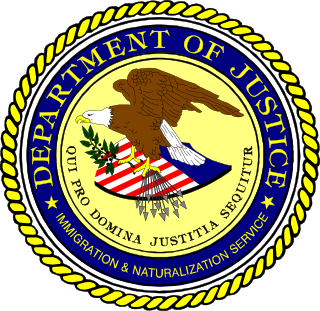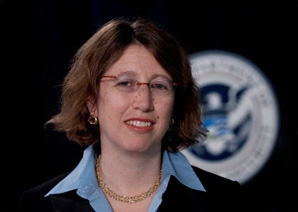
The United States Immigration and Naturalization Service (INS) was an agency of the U.S. Department of Labor from 1933 to 1940 and the U.S. Department of Justice from 1940 to 2003.
The National Security Entry-Exit Registration System(NSEERS) or INS Special Registration was a system for registering certain non-citizens within the United States,initiated in September 2002 as part of the War on Terrorism. Portions were suspended as of April 27,2011,and the entirety of the regulation was removed on December 23,2016.

The United States secretary of homeland security is the head of the United States Department of Homeland Security,the federal department tasked with ensuring public safety in the United States. The secretary is a member of the Cabinet of the United States. The position was created by the Homeland Security Act following the attacks of September 11,2001.
U.S. Immigration and Customs Enforcement is a federal law enforcement agency under the U.S. Department of Homeland Security. ICE's stated mission is to protect the United States from cross-border crime and undocumented immigration that threaten national security and public safety.

The Real ID Act of 2005 is an Act of Congress that establishes requirements that driver licenses and identification cards issued by U.S. states and territories must satisfy to be accepted for accessing federal government facilities,nuclear power plants,and for boarding airline flights in the United States. The requirements include verification of the personal information presented when applying for the identification document,security features on the document,and electronic sharing of databases between states. The act also made various modifications to U.S. immigration law regarding asylum,border security,deportation,and specific work visas.

Kenneth Thomas "Cooch”Cuccinelli II is an American lawyer and politician who served as the senior official performing the duties of the Deputy Secretary of Homeland Security from 2019 to 2021. A member of the Republican Party,he also served as the Principal Deputy and Senior Official Performing the Duties of the Director of U.S. Citizenship and Immigration Services (USCIS) and was Attorney General of Virginia from 2010 to 2014.
Section 287(g) of the U.S. Immigration and Nationality Act authorizes the Department of Homeland Security (DHS) to deputize selected state and local law enforcement officers to enforce federal immigration law. Section 287(g) allows the DHS and law enforcement agencies to make agreements,which require the state and local officers to receive training and work under the supervision of U.S. Immigration and Customs Enforcement. ICE provides the officers with authorization to identify,process,and—when appropriate—detain immigration offenders they encounter during their regular,daily law-enforcement activity.
In the United States,removal proceedings are administrative proceedings to determine an individual's removability under federal immigration law. Removal proceedings are typically conducted in Immigration Court by an immigration judge (IJ).
Leon Wildes was an American lawyer who was the founder and a senior partner of the New York City-based immigration law firm,Wildes &Weinberg P.C.,which maintains offices in New York City,Englewood,New Jersey,and Miami. He specialized in immigration law.

The United States government holds tens of thousands of immigrants in detention under the control of Customs and Border Protection and the Immigration and Customs Enforcement (ICE).

Margo Jane Schlanger is a Professor of Law at the University of Michigan Law School,and the founder and director of the Civil Rights Litigation Clearinghouse. Previously,she was at Washington University School of Law. From 2010 to 2012,while on leave from her professorial position,she served as the presidentially-appointed Officer for Civil Rights and Civil Liberties at the United States Department of Homeland Security. As the top civil rights official at the Department of Homeland Security,Schlanger led the office that advises department leadership about civil rights and civil liberties issues,engages with communities whose civil rights and civil liberties may be affected by Department activities,investigates and resolves civil rights complaints,and leads the Departments equal employment opportunity program. Schlanger's major initiatives as Civil Rights and Civil Liberties Officer included:creating and managing a structure for overseeing the Department's controversial Secure Communities program to ensure that it did not serve as a conduit for unconstitutional practices by local law enforcement agencies in jurisdictions covered by the program;publishing guidance for agencies that receive DHS funding on providing meaningful access to people with limited English proficiency;working with U.S. Immigration and Customs Enforcement on the reform of detention practices;and improving the department's civil rights complaint process.
Expedited removal is a process related to immigration enforcement in the United States where an alien is denied entry to and/or physically removed from the country,without going through the normal removal proceedings. The legal authority for expedited removal allows for its use against most unauthorized entrants who have been in the United States for less than two years. Its rollout so far has been restricted to people seeking admission and those who have been in the United States for 14 days or less,and excludes first-time violators from Mexico and Canada.
Stephen Yale-Loehr,is an American law professor and immigration law attorney. Yale-Loehr earned his undergraduate and law degrees from Cornell University in 1977 and 1981,respectively. He was editor-in-chief of the Cornell International Law Journal during his time at the law school. Upon graduating he clerked for Judge Howard G. Munson of the U.S. District Court,Northern District of New York,nominated by President Gerald Ford. Yale-Loehr has been a member of the Cornell Law faculty since 1991.
The Priority Enforcement Program is a program by U.S. Immigration and Customs Enforcement (ICE),the agency responsible for immigration enforcement in the interior of the United States,under the U.S. Department of Homeland Security (DHS). PEP was an ICE program that worked with state and local law enforcement to identify illegal aliens who come in contact with state or local law enforcement,and remove those who are removable. PEP was announced by DHS Secretary Jeh Johnson in a November 20,2014 memo as a replacement for Secure Communities (S-COMM). It builds on an updated list of immigration enforcement priorities released in another memo by Johnson issued on the same day.
Immigrant surveillance refers to the practice of tracking both illegal and legal immigrants through several methods,some of which include electronic verification,border surveillance,or federal raids. Historically,countries such as the United States have required that immigrants carry evidence of citizenship. Controversies within immigrant surveillance in the United States involve the alleged racial profiling committed by police departments and negligence found in detention centers. Laws concerning surveillance and immigration vary by country but terrorist attacks have made the issue more prevalent.
Wolf v. Vidal,591 U.S. ___ (2020),was a case that was filed to challenge the Trump Administration's rescission of Deferred Action for Childhood Arrivals (DACA). Plaintiffs in the case are DACA recipients who argue that the rescission decision is unlawful under the Administrative Procedure Act and the Fifth Amendment. On February 13,2018,Judge Garaufis in the Eastern District of New York addressed the question of whether the government offered a legally adequate reason for ending the DACA program. The court found that Defendants did not provide a legally adequate reason for ending the DACA program and that the decision to end DACA was arbitrary and capricious. Defendants have appealed the decision to the Second Circuit Court of Appeals.
Federal policy oversees and regulates immigration to the United States and citizenship of the United States. The United States Congress has authority over immigration policy in the United States,and it delegates enforcement to the Department of Homeland Security. Historically,the United States went through a period of loose immigration policy in the early-19th century followed by a period of strict immigration policy in the late-19th and early-20th centuries. Policy areas related to the immigration process include visa policy,asylum policy,and naturalization policy. Policy areas related to illegal immigration include deferral policy and removal policy.

The immigration policy of American President Joseph Biden initially focused on reversing many of the immigration policies of the previous Trump administration,before implementing stricter enforcement mechanisms later in his term.
In 2011,the U.S. Immigration and Customs Enforcement Agency revised its national detention standards and developed the Performance-Based National Detention Standards. According to U.S. Immigration and Customs Enforcement,"the PBNDS 2011 are crafted to improve medical and mental health services,increase access to legal services and religious opportunities,improve communication with detainees with no or limited English proficiency,improve the process for reporting and responding to complaints,and increase recreation and visitation." The PBNDS of 2011 is an important step in United States detention reform. Many revisions reflect efforts to tailor detention practices to the United States border's unique demands and circumstances. The PBNDS of 2011 revised detention standards among seven different sections. Although all sections detail essential contributions to improving the safety,security,order,care,activities,justice,and administration/management of U.S. border control,there are sections pertaining to the specific conditions of undocumented women.







